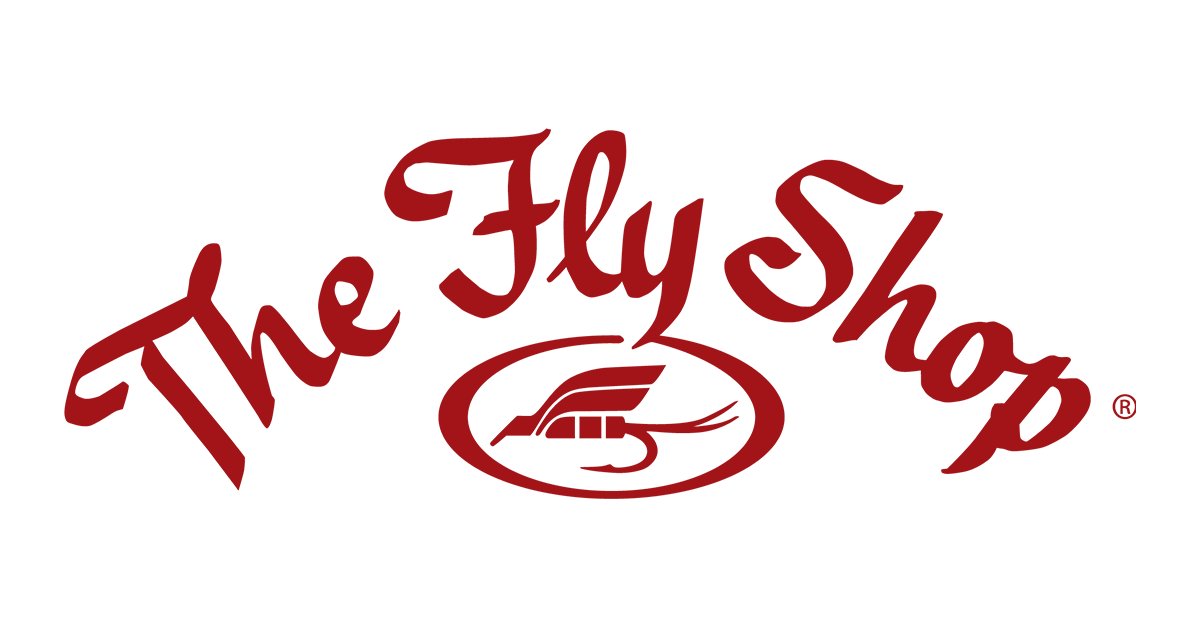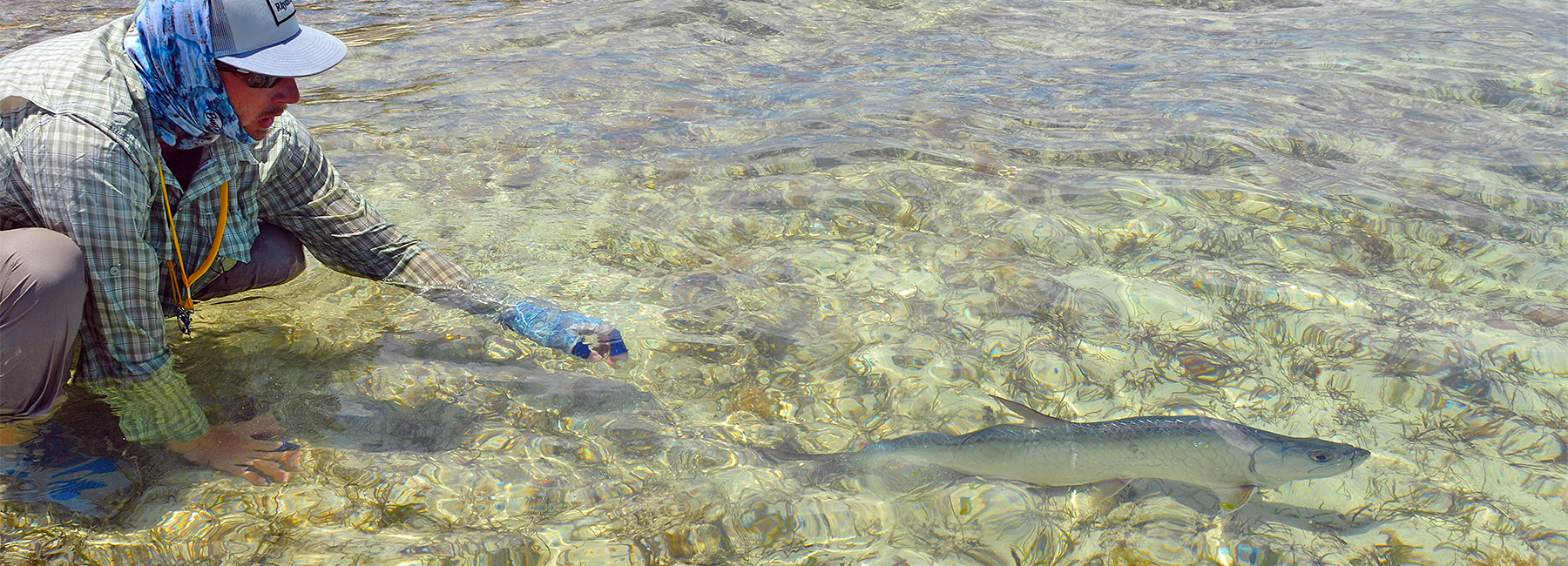GPS Coordinates: 22°43’37.34″N 74°08’27.33″W
Trip Questionnaire: Please click on the link below. This will take you an electronic questionnaire form that we ask you to complete and submit to The Fly Shop®. Please be sure to click the “Submit” button at the end of the form. The information provided will help us — and the outfitter best coordinate your trip.
THANK YOU! CLICK HERE
This is one of the least-visited fisheries in the Bahamas, and about as far south as you can go without landing on the Turks and Caicos. The southerly location is significant when you consider the weather patterns that bring winters chill and harsh winds to the northern Bahamas. These shallow, firm flats are home to abundant schools of bonefish averaging three to four pounds, and a ten plus pound fish is a daily possibility. If you enjoy wading into position to make a precise presentation up close and personal, then this fishery should not be overlooked. It’s a wade fisherman’s dream, with shallow hard sand flats extending for miles.
The islands of Crooked and Acklins are located in the far southeastern portion of the Bahamas, 239 miles southeast of Nassau. Acklins and Crooked Island are two of the four islands forming an atoll which hugs the beautiful shallow waters of the Bight of Acklins, a 500-square-mile lagoon. Total land mass of Crooked Island is 57 square miles, while Acklins island totals 150 square miles. The islands are located less than 60 miles from the Haitian and Cuban coastlines and both islands maintain a population of no more than 500 +/- permanent residents.
In addition to the incredible bonefish opportunities, the in-shore fishing is excellent for jacks, snapper, shark, mackerel, barracuda, and grouper. Trigger fish are available on the coral flats, and juvenile tarpon can be found in protected backcountry lagoons. Wahoo, yellowfin tuna and dorado (mahi- mahi) are target species for those anglers venturing offshore, with blue water depths just a few miles off the of the coast.
Bordered by the nearly uninhabited Castle Island and Long Cay, they are as natural as they were when The Bahamas was first “discovered.” Columbus reputedly sailed down the leeward side of the islands through the narrow Crooked Island Passage, which has ever since served as an important route for steam ships travelling from Europe to Central and South America. This seaway, referred to locally as ‘the going through,’ also earned these islands the notorious reputation as convenient bases for buccaneers and pirates, who attacked ships in these shallow waters.
The islands are two of the Bahamas’ most natural and unspoiled islands and are popular for diving, snorkeling, and bonefish fishing, as well as other leisure activities.
Getting to Crooked & Acklins Island Lodge
Most anglers fly commercially to Nassau International Airport (NAS). There are numerous daily flights to Nassau from many of the larger U.S. cities.
Direct to Nassau from United States:
- Delta – https://www.delta.com/
- JetBlue – https://www.jetblue.com/
- Silver Airways – https://www.silverairways.com/
- American Airlines – https://www.aa.com
- Southwest Airlines – https://www.southwest.com/
- United – https://www.united.com
- Bahamasair – https://www.bahamasair.com/
Other Airlines Flying to Nassau International:
- Air Canada – https://www.aircanada.com
- Copa – https://www.copaair.com
- Caribbean Airlines – https://www.caribbean-airlines.com
- WestJet – https://www.westjet.com
- British Airways – https://www.britishairways.com
All U.S. citizens are required to have a valid passport that does not expire within six months of their trip dates. Please be sure that your passport has at least two blank, unstamped pages remaining in the back, and that it is not torn, delaminated, or damaged in any way.
Arrival Day:
The most popular option in travel to Crooked & Acklins Island Lodge is flying to Nassau’s Lynden Pindling International Airport (NAS) and then taking a Bahamas Air flight to Crooked Island’s Colonel Hill Airport (CRI). Wednesdays and Saturdays are designated arrival and departure days for the island via scheduled commercial service on Bahamas Air for the two hour flight.
You can make a reservation and payment on their website, www.bahamasair.com. The round-trip fare on Bahamas Air is usually around $350.00 per person. Sometimes these flights are late, and every once in a while, they will even leave early! So be prepared to be in the waiting area a bit ahead of schedule, please be patient and prepared to wait a bit. There is a decent bar, a Duty Free shop, and a Dunkin’ Donuts for food in the waiting area in the Nassau airport.
If you are flying commercially into Nassau International Airport you will first clear immigrations, retrieve your luggage and clear customs. Once you have cleared customs, you will recheck yourself and luggage to Crooked Island at the nearest Bahamas Air counter.
Once you arrive in Colonial Hill, a lodge representative will meet you at the airport for the short drive to the lodge. The manager will greet you at the lodge and help you get checked in and comfortable.
Departure Day:
Please reconfirm your flight arrangements with the lodge the night before departure. Transportation from Crooked & Acklins Island Lodge to Colonial Hill is provided by the lodge. As you leave Nassau, a Bahamas departure tax of approximately $15 is assessed at the airport (this is usually built into your international flight fare).
Contact Information
Should any problems occur during your travel, including significant flight delays please be sure to have the following emergency contact information with you. Please contact the Little Abaco owners or The Fly Shop® directly.
Crooked & Acklins Island Lodge Emergency Contact Numbers:
Christine Gibson (Lodge Manager): (242) 468-0669 (first contact in case of a travel delay…)
Carnetha Knowles (Lodge Staff): (242) 357-1426
Orville Williamson: (242) 395-7386
The Fly Shop®
(800) 669-3474 | (530) 222-3555 | travel@theflyshop.com
Emergency Assistance:
In case of emergencies involving the death, injury, welfare, or arrest of an American citizen in The Bahamas or the Turks and Caicos Islands, please call (242) 328-3496 or (242) 311-1181 x9 during business hours, and (242) 357-7004 at all other times. (Please note that the Duty Officer who answers this number will not be able to assist with visa or routine passport matters.)
General Travel Information
Travel Documents:
A valid passport is required for all travelers and must be valid for six months beyond the arrival date. All travelers must have return or continuing tickets to pass through customs. A visa is not required for Americans, Canadians or most European countries. Residents of other countries should contact the Bahamian Embassy in their country to double check that a visa is not required.
You will complete an immigration card upon arrival. It will be checked at your first point of entry and a copy will be given to you. Be careful not to lose this copy as it must be given back to Immigration upon departure.
Staying in Nassau:
There are many options for your stay in Nassau, ranging from small family-owned inns situated in quieter areas to full-scale casino/resorts on Cable Beach and Paradise Island. There is an array of restaurants and clubs, day cruises and other activities. Below are some of our recommendations but we encourage you to hop on any of the popular travel websites and do some research of your own. As always, feel free to contact us with any questions.
Nassau Hotels:
Sandy Port Hotel and Resort
West Bay Street
(242) 327-4279 | info@sandyport.com
- SandyPort Hotel is part of the greater SandyPort Development. It is located 10 minutes from the airport and can be a great choice for your over-night in Nassau. You will find a variety of dining options, stores and even a health club within walking distance of your accommodations. It has a relaxing atmosphere and a very professional staff.
Orange Hill Beach Inn
West Bay Street
(242) 327-7157 | Info@orangehill.com)
- Orange Hill is a quaint family-owned inn 5 minutes from the airport. It is a convenient, economical choice for our traveling anglers. It sits across the street from a nice quiet beach and has a small bar/restaurant and a refreshing outdoor pool.
British Colonial Hilton
No. 1 Bay Street
(242) 322-3301
- The British Colonial is a beautiful, well-appointed, luxury hotel situated right in the heart of the action on famous Bay Street. The grounds are amazingly quiet considering where it is situated. It is everything you expect from an International Hilton property and places you within walking distance of all the shops and restaurants of downtown.
Atlantis Resort and Casino
Paradise Island
(242) 363-2000 x 65401
- The grandeur of “The Atlantis” is hard to describe. It truly is a “mega” resort in the spirit of Las Vegas. It houses one of the largest aquariums in the world, a Vegas-style casino and numerous shops and restaurants. It hums with energy and activity 24 hours a day. If you are staying elsewhere in Nassau, it is worth taking a taxi to Paradise Island and wandering through.
Nassau Restaurants:
Indigo Cafe and Deli
West Bay St. and Skyline Dr.
(242) 327-2535
- Indigo is a relaxing, stylish Cafe with a very eclectic menu of wonderfully prepared foods. Choose from local Bahamian, Asian, and European cuisine, even an impressive selection of fantastic sushi! They also have a full service bar and espresso.
The Poop Deck West
SandyPort on the Beach/West Bay Street
(242) 327-3325
- An island favorite, the Poop Deck features a full bar, great steak, seafood and traditional Bahamian dishes.
Twin Brothers
Arowak Cay
(242) 328-5033
- Located at the Arowak Cay Fish Fry Grounds, Twin Brothers is a fun, relaxing place to enjoy great local Bahamian cuisine. It is a favorite among the locals. Enough said?
Clay Oven
Downtown
(242) 325-8639
- A wonderful, reasonably priced authentic Indian Restaurant. This is where our manager eats when he’s in Nassau!
Green Parrot Paradise Island
Hurricane Hole
(242) 322-9248
- A well-known, very popular outdoor bar and grill that sits on the Hurricane Hole Marina. This is a fun place to hang out day and night watching the boat traffic in and out of Nassau Harbor, while chatting with the crews of the many yachts that are parked in the marina.
Staying in Ft. Lauderdale:
Here are a few recommendations for lodging and entertainment for our guests who have some time in Fort Lauderdale on either side of their trip.
Hotels:
Courtyard® by Marriott®
Port 400 Gulf Stream Way/Dania Beach, Florida 33004
(954) 342-8333
- The Courtyard at the Fort Lauderdale Airport is a hotel that’s just a couple of miles from the airport. The rooms are nice and the hotel shares a parking lot with the IGFA Museum, Bass Pro Shops, and the Islamorada Fish Company. The Courtyard provides free shuttle service to and from the airport.
Restaurants and Attractions:
Seminole Hard Rock Casino
1 Seminole Way/Hollywood, FL 33314
(866) 502-7529
- About 15 minutes from the airport and its hotels is the large Hard Rock Casino complex on the Seminole Indian reservation. In addition to the hotel and casino, the complex includes 18 restaurants in a variety of styles, all with outdoor seating, 13 bars and clubs, and some high-end shopping. The cuisine includes something for everyone, and the people-watching is a sport unto itself!
IGFA Museum
300 Gulf Stream Way/Dania Beach, FL 33004
(954) 922-4212
- If you want to see some really big fish, stop off at the IGFA Museum and Hall of Fame. It’s located very near the airport and the Wyndham.
General Lodge Information
Lodge Communication:
There is cell service throughout the island. Check with your carrier prior to departure to be sure you have international coverage. The lodge does provide free internet and Wi-Fi service that guests are able to access from their rooms or at the lodge. The bandwidth is limited to simple emails and texts.
Phone Calls:
Cell phones work most places in major cities such as Nassau or Freeport, but you will want to make sure your plan allows for international coverage. On the Out Islands, cell coverage is decent depending on your carrier; some areas will have good coverage, others will not.
Electrical Outlets:
The electrical outlets are AC 110 volts (same as the U.S.) and most appliances will work fine. Make sure that you have plenty of spare batteries for cameras and other small appliances, as the cost for replacements in the Bahamas is high.
Insects:
Mosquitoes and “doctor flies” in the Bahamas are prominent during the rainy season, from April through September. Year round, tiny biting “No See’ums” can also come out at dawn and dusk and whenever the winds are exceptionally calm. The Bahamian doctor fly is basically a large horsefly on steroids, whose bite will draw blood. (Why do they call them doctor flies? “Because when de bite, mon, it feels like a SHOT!”) They prefer salt-coated skin, and love to harass anglers who are wading shallow waters and mangrove-filled areas. Wearing long pants and long sleeves while fishing, and insect repellent (with DEET) will deter these bugs. If you can find it, Avon Skin-So-Soft is the best deterrent for No-See-Ums.
Laundry:
The staff will wash your laundry twice each week. A gratuity is appreciated for the service.
Alcohol:
The bar stocks a limited selection of wine and spirits, and domestic beers, not included in your package. If you have a specific beverage that you would like to enjoy on your trip, it would be best to bring it with you.
Gratuities:
Gratuities are at you own discretion, and should reflect your feelings about the service received. As you will rotate your guides each day, please tip your guide at the end of the fishing day. $100.00 per boat per day ($50 per person, per day) is suggested, and you are always welcome to increase that amount if you feel that your guide deserves it.
The staff should be tipped at the end of your stay, with $150.00 per person per week suggested. Cash in U.S. dollars is the best way to leave gratuities. Again, tipping is always at your discretion, and greatly appreciated by those who serve you. Please have Cash in US$ for Gratuities.
Bahamas License Requirements for South Andros:
All persons over the age of 12 are required to have a license to fish the flats. Licenses are issued by the Department of Marine Resources in New Providence, or the Out Island Administrators in the Out Islands.
Fly fishing licenses will be available at Go Outdoors Bahamas for pre-registration.
Clothing & Equipment
Crooked Island may be the most informal place on the planet Earth. Comfortable, casual wear is accepted and encouraged. Flip-flops, sandals, shorts, T-shirts…casual is king. Expect air temps in the mid-80’s during the days, and high 60’s to low ‘70’s in the evening and early mornings. We recommend long-sleeved shirts and long pants while on the flats. Liberally apply a waterproof sunblock of at least 30 SPF rating to all exposed skin including your ears and lips. Re-apply occasionally through the day and consider a wide-brimmed hat or Buff. After applying sunscreen, scrub your hands with a scoop of sand and water as bonefish can smell lotion on your fly and will quickly turn away.
Although casual tropical attire will generally work great during your time on the water, there are three fishing specific items that are critical for each angler to bring: a raincoat, for boat spray or the occasional cloudburst, polarized sunglasses to help you see the fish, and flats boots or other footwear suitable for wading. Since the flats that we wade vary greatly in their bottom surface (hard sand, soft sand and grass) we do not recommend wading sandals; boots are greatly preferred. Even on sunny days we suggest including a rain jacket in your boat bag. Boat spray can occur at any time and a cloudburst can form when least expected.
Wading Pants:
Lightweight pants are strongly recommended for both sun and insect protection.
Chest, Back, or Fanny Pack:
You may be wading for hours and the boat will be just a spec on the horizon. Be sure to bring a wading pack to carry your flies, leaders, tippet, clippers, a water bottle, camera, etc.
Tools:
Pliers, hemostats, release tool, line nippers, hook sharpener.
Rain Gear:
Lightweight and breathable is the best for the climate. Bring your rain gear with you on the boat everyday no matter how clear it looks. Squalls pop up quickly and the boat ride can be wet.
Sunglasses:
Polarized glasses with amber or copper lenses are the most popular, and having an extra pair in your boat bag is always the smart thing to do.
Tackle & Equipment
Multiple Rods:
We strongly suggest that you have an arsenal of fly rods strung-up, handy and ready to fish. Most of the flats fishing you’ll encounter is what we call “opportunistic fishing.” This means that at any given time, on any given day, on any piece of water, you may see bonefish, permit, tarpon, barracuda or jacks and it may all happen in a matter of minutes or all at the same time. The idea here is to be ready for anything at any time. If you have three or four rods, bring them with you. Have the rods ready to fish, one with a bonefish fly, and another with a permit crab, or maybe a ‘cuda fly, and another with a tarpon streamer or shark fly. If you are wading the flats, have your guide take one of the other rods along. At the least, it will double as a great fish pointer.
Tackle & Equipment Lists by Species (click on links below):


